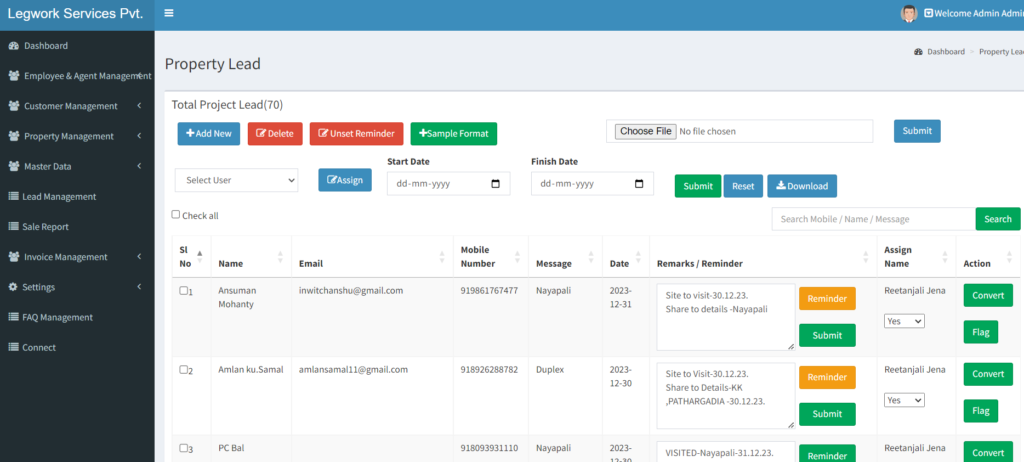In the fast-paced and competitive world of real estate, success hinges on effective client management, streamlined processes, and strategic decision-making. Real estate professionals are continually seeking tools that can empower them to stay ahead of the curve and optimize their business operations. One such game-changing tool is a Customer Relationship Management (CRM) system designed specifically for the real estate industry.
In this blog post, we will explore the myriad ways in which a Real Estate CRM can enhance and revolutionize your real estate business, from lead generation to closing deals and beyond.
Centralized Data Management: A Foundation for Success
Successful real estate transactions often involve a multitude of details and data points. A Real Estate CRM serves as a centralized hub where all client information, property details, and transaction history are stored. This not only facilitates easy access to critical data but also ensures that every member of your team has a comprehensive view of the client’s journey.
Efficient Communication: Strengthening Client Relationships
Communication is the lifeblood of any real estate business. Real Estate CRM systems empower professionals to streamline their communication processes. Automated features enable personalized messages, timely updates, and efficient follow-ups. This level of communication not only enhances client engagement but also fosters stronger and more lasting relationships.
Lead Management and Nurturing: Turning Prospects into Clients
Effectively managing leads through the sales funnel is paramount in real estate. Real Estate CRM systems offer robust lead management tools that track leads, automate nurturing workflows, and ensure that no potential opportunity falls through the cracks. By systematically guiding leads through the conversion process, real estate professionals can significantly improve their chances of turning prospects into satisfied clients.

Task and Calendar Management: Real Estate CRM Staying Organized for Success
Success in real estate often requires juggling numerous tasks and appointments. A Real Estate CRM simplifies task and calendar management, allowing agents to schedule appointments, set reminders, and prioritize tasks efficiently. This organizational efficiency not only saves time but also minimizes the risk of missing crucial deadlines or appointments.
Analytics and Reporting: Informed Decision-Making
In a data-driven era, analytics play a pivotal role in shaping business strategies. Real Estate CRM systems provide comprehensive analytics and reporting tools that offer insights into various aspects of the business. From lead conversion rates to marketing effectiveness, these tools empower real estate professionals to make informed decisions, identify areas for improvement, and capitalize on strengths.
Document Management: Securing Your Business Transactions
Real estate transactions involve a multitude of documents, contracts, and paperwork. A Real Estate CRM simplifies document management by providing a secure repository for all essential files. This not only ensures that important documents are readily accessible but also reduces the risk of misplacing or losing critical paperwork.
Automation of Repetitive Tasks: Focusing on What Matters
Real estate professionals often find themselves bogged down by repetitive administrative tasks. A Real Estate CRM automates these tasks, such as data entry, appointment scheduling, and email follow-ups. This automation allows agents to redirect their time and energy towards high-value activities, such as building relationships and closing deals.
Improved Customer Service: Elevating Client Satisfaction
Exceptional customer service is a hallmark of successful real estate businesses. Real Estate CRM systems contribute to improved customer service by providing a comprehensive view of client preferences and interactions. This enables agents to offer more personalized and timely service, ultimately leading to increased customer satisfaction and positive word-of-mouth referrals.

Marketing Campaigns: Targeting the Right Audience
Marketing is a crucial component of real estate success. Real Estate CRM systems can seamlessly integrate with marketing tools, allowing for more targeted and effective campaigns. By segmenting the audience based on various criteria, agents can send tailored messages, significantly enhancing the overall effectiveness of their marketing efforts.
Scalability and Growth: Future-Proofing Your Business
As a real estate business expands, so do its data and user requirements. Real Estate CRM systems are designed to scale alongside the business, ensuring that the CRM remains a valuable asset during periods of growth. This scalability feature contributes to the long-term success and sustainability of the real estate business.
In conclusion, a Real Estate CRM is not merely a tool; it is a strategic asset that can transform the way you conduct business in the real estate industry. From centralizing data management to automating repetitive tasks and improving customer service, the benefits of integrating a Real Estate CRM into your operations are vast and impactful.
By leveraging the power of technology, real estate professionals can enhance their efficiency, foster stronger client relationships, and position themselves for sustained success in an ever-evolving market. Embracing a Real Estate CRM is not just an investment in software; it’s an investment in the future success and growth of your real estate business.









One thought on “Maximizing Success: How Real Estate CRM Can Transform Your Business in 2024”